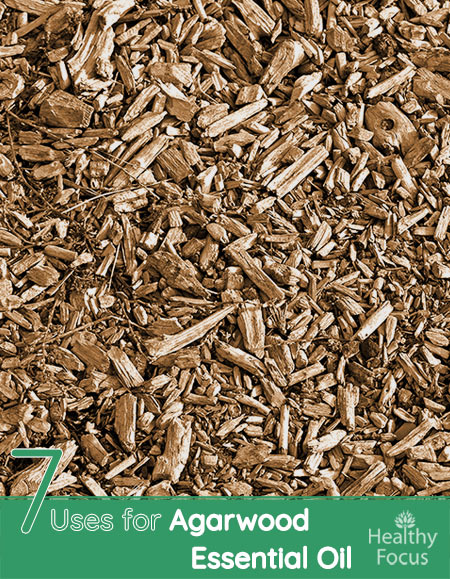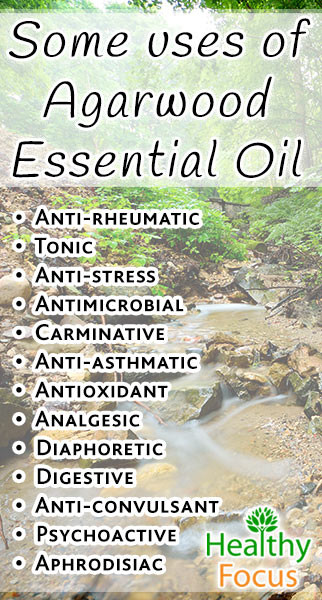Agarwood Essential Oil
Known also as Oud oil, agarwood is one of the most precious, rare and certainly most expensive essential oils in existence today. Agarwood is sometimes called Aloeswood. The essential oil is derived from the heartwood of the agarwood tree. There are a number of popular species but typically aquilaria malaccensis, aquilaria agallocha or Aquilaria crassna are used to make the oil. Agarwood is native to India as well as several areas of South East Asia including Vietnam, the Philippines and Indonesia.
When the trees are healthy, agarwood has a light or pale color but when it is infected by disease, the process of infection creates a response to the attack resulting in a very dark and incredibly aromatic resin known as oleoresin. It is this rich dark resin which is so highly prized and from which agarwood essential oil is extracted.
In the wild, the production of this resin can take many years and like a good wine, the older the resin-the more prized it becomes. Because of its huge cost and extreme rarity in the wild, the trees are now cultivated and the resin is actually created by artificial infection and its essential oil extracted by water distillation.
There are many grades of Agarwood oil. The quality of grade is dependent on the grade of wood used and the length of distillation. Typically, the longer the distillation time the higher the grade.
You are going to spend hundreds for 5ml and it is typically sold by weight. Because of its rarity and mythic status in almost all of the worlds religions–it is extremely expensive. The scent is particularly sought after. It is believed to be the most powerful natural aphrodisiac.
Most Agarwood oil is purchased and consumed primarily by Saudi Arabia and Japan. There are no truly similar species or known sythetics that come close to the real scent. The fungal infection that helps create the resin makes its extract very unique.
Adulteration can and does happen on many levels. On the raw materials level–trees either uninfected or a lower grade of wood. Often it can even be a different but similar species of tree. Even among infected trees the method of infection (natural or stimulated) can have an effect on the compounds in the wood. (1)
On the distillation level–the distiller can include the hydrosol with the essential oil or lie about the length of distillation.
On the distribution level–the oil is cut with other oils or synthetic chemicals are added to attempt to replicate the scent.
In other words-you are not going to get it for $30 on amazon. We will assume you have access to the real stuff–because finding and knowing legitimate Agarwood is a task upon itself.
[UPDATE] We have found a great vendor for Agarwood (Oud) Oil- Religious texts were written on bark from agar trees and Srimanta Sankardev referred to agarwood as one of the divine trees with the ability to fulfill human desire.
- Burning Agarwood was called the ‘scent of Nirvana’ by The Lord Buddha.
- It is extensively mentioned in the Sanskrit Vedas as a favorite of Lord Krishna.
- Agarwood has played an important role in many religious traditions all over the world. It has been revered for millennia for its fragrance in a religious ceremony and its incense burned at the burial of Jesus Christ.
- King Louis XIV had his clothing washed in water scented with agarwood.
- Agarwood smoke was used to scent the armor of Samurai warriors before heading into battle.
- In Genesis, agarwood is mentioned as the only tree from which Adam and Eve could take cuttings.
- Although it is not that well known in the West, agarwood has a rich history of medicinal use in many cultures. It has been used for centuries by physicians in Tibet, India, China and the Arab world to treat a range of physical and mental conditions.
- The Prophet Mohammed used Agarwood to perform fumigation rituals, a practice which is continued today by Orthodox Muslims.
Properties of Agarwood Essential Oil
This is an essential oil with enormous healing potential that covers a huge range of complaints. Its therapeutic benefits owe a great deal to its chemical make-up which gives agarwood essential oil a range of properties that include the following:
• Anti-rheumatic
• Tonic
• Anti-stress
• Antimicrobial
• Carminative
• Anti-asthmatic
• Antioxidant
• Analgesic
• Diaphoretic
• Digestive
• Anti-convulsant
• Psychoactive
• Aphrodisiac
Uses of Agarwood Essential Oil
1. The Mind
Agarwood essential oil is used for countless physical purposes but it is its long history of use in matters of the mind and for spiritual purposes that probably sets it apart.
Ayurvedic practitioners have long used agarwood oil for its ability to provide spiritual and emotional benefits. According to Ayurvedic tradition, agarwood oil illuminates the mind and strengthens the power of thought, elevates your emotional quotient and when used in meditation can set you on the path to spiritual enlightenment. When inhaled, the fragrance of agarwood essential oil helps focus the mind and get rid of negativity.
It can be used to alleviate some of today’s common complaints such as stress and anxiety while increasing feelings of calm and tranquility.
- You can inhale a few drops directly when necessary or diffuse it next to your bed at night. Agarwood oil can help with insomnia because one of its natural compounds is valerian which is associated with its ability to promote calm and deeper sleep.
Tibetan monks use agarwood essential oil to increase their inner energy and bring tranquility to the mind and the soul while in Feng Shui agarwood is used because of its ability to enrich one’s spirit and penetrate the senses. In meditation, agarwood is used to clear the mind allowing absolute focus with the self; it instills absolute inner peace, positive energy, and enhanced awareness.
2. Rheumatism and pain relief
Agarwood oil has been used for many years and is still used today to alleviate many painful conditions including rheumatism and other forms of arthritis. This oil has anti-rheumatic, anti-inflammatory and analgesic properties that make it a useful natural and safe treatment for those looking for effective pain relief.
- Dilute your agarwood oil with a suitable carrier oil such as coconut or jojoba to make a wonderful pain relieving massage oil. Alternatively, you can add a few drops of agarwood essential oil to a hot compress and apply it over the affected area.
3. Sex drive
There is a large body of writing associating agarwood essential oil with sexual problems. It is widely claimed that agarwood oil has aphrodisiac properties-it can enhance the libido, boost sperm count and even combat premature ejaculation.
- When applied to the skin, the scent is released slowly over around 12 to 15 hours but be careful to do a patch test first or to be on the safe side simply dilute it with alcohol or a fragrant carrier oil.
4. Diuretic function
Agarwood essential oil has diuretic properties meaning that it promotes more frequent urination as well as increasing the quantity of urine produced. This means that agarwood essential oil can be used to help detoxify the body and clean out any excess salt and uric acid that can lead to a number of complaints.
5. Digestive Function
Agarwood essential oil has been used throughout the centuries to treat a number of digestive issues. Agarwood has carminative and stomachic properties that can help relieve embarrassing and painful gas build up in the stomach while also preventing any build-up of gas for those who are prone.
- When massaged into the tummy, Agarwood essential oil is also said to support the secretion of digestive acids and gastric juices and relieve indigestion and bloating.
- Japanese research has shown that the leaves of Agarwood can be used in a tea to act as a natural laxative. (2)
6. Skin
Agarwood essential oil is also used as a general skin tonic and can help nourish the skin and treat a number of skin conditions. Agarwood essential oil helps to repair damaged skin cells and fight the damage caused by the free radicals that we face every day. Many of the signs of aging such as wrinkles and age marks can be treated with agarwood essential oil.
- Add a drop of agarwood oil to your normal face cleanser to improve the tone and complexion of your facial skin.
7. Other Uses
There are a considerable number of other medicinal uses for agarwood essential oil that I do not have the time to go into in any detail. They include epilepsy; liver complains such as cirrhosis and hepatitis; fever and chills. It is used for delivery pain during and after birth, nausea, and vomiting. It has even been used to treat a variety of cancers such as gastric, abdominal and lung cancer but I have been unable to find any scientific proof regarding its efficacy in this regard.
Research on Agarwood and its Compounds
- Research on mice has shown compounds in Agarwood have an anesthetic and sedative effect.
- Another compound was shown to be effective as a cough reliever
- In mice, some compounds showed a CNS benefit–antimicrobial – against MRSA, Candida, and Staph (but ineffective vs e. Coli)
- One compound showed a strong antioxidant effect in humans
- Another Agarwood compound showed potential as a cell-killing agent for gastric cancer cells
Source for all studies (3)
How to Use it
- Diffuse it whenever you feel the need for calm and focus.
- Massage it into your entire body or into areas affected by soreness and pain. Be sure to dilute it with your chosen carrier oil before applying it topically.
- Wear it-it smells great and reacts wonderfully with the skin.
- Add a few drops to a warm bath for a truly relaxing experience.
- Add a drop or two to your body wash or facial cleanser to re-invigorate the skin.
Agarwood essential oil Side Effects
- Agarwood essential oil is considered safe to use and there are no known side effects.
- Women who are pregnant or breastfeeding should always consult a doctor before using any essential oils including agarwood.
- Agarwood essential oil is considered safe to apply topically but it is always best practice to dilute essential oils with a carrier oil and do a patch test first.
(1) http://www.sciencedirect.com/science/article/pii/S0959943613000205 Characterization of the Chemical Constituents of Agarwood Oils from Malaysia by Comprehensive Two-Dimensional Gas Chromatography–Time-of-Flight Mass Spectrometry
(2) International Scientific Symposium on Agarwood (ISSA) http://www.forr.upm.edu.my/ISSA_BM



Leave a Reply
You must be logged in to post a comment.